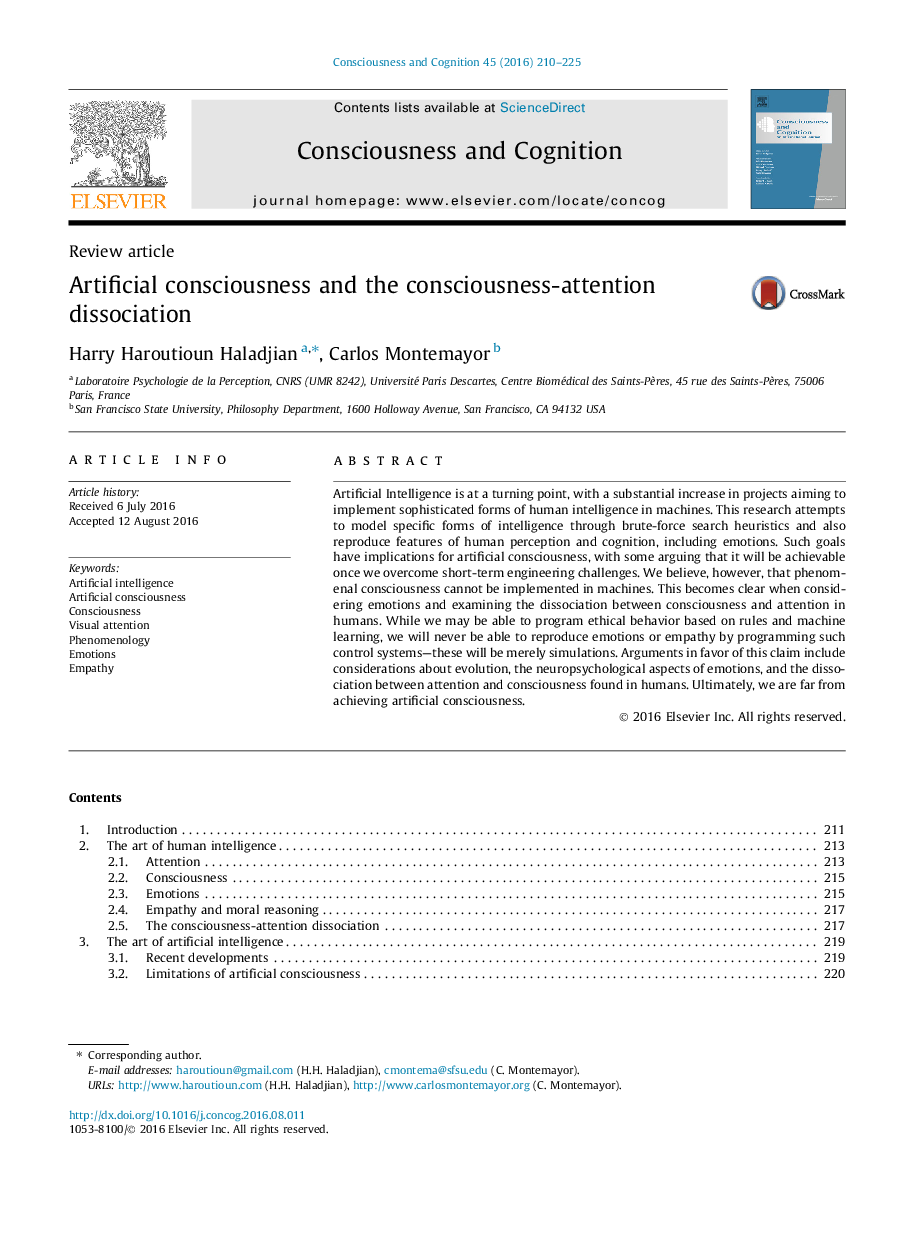| کد مقاله | کد نشریه | سال انتشار | مقاله انگلیسی | نسخه تمام متن |
|---|---|---|---|---|
| 7288304 | 1474166 | 2016 | 16 صفحه PDF | دانلود رایگان |
عنوان انگلیسی مقاله ISI
Artificial consciousness and the consciousness-attention dissociation
ترجمه فارسی عنوان
آگاهی مصنوعی و تفکیک آگاهی-توجه
دانلود مقاله + سفارش ترجمه
دانلود مقاله ISI انگلیسی
رایگان برای ایرانیان
کلمات کلیدی
هوش مصنوعی، آگاهی مصنوعی، آگاهی توجه ویژهای، پدیده شناسی، احساسات، یکدلی،
ترجمه چکیده
هوش مصنوعی است در یک نقطه عطف، با افزایش قابل توجهی در پروژه با هدف پیاده سازی اشکال پیچیده از هوش انسان در ماشین آلات. این تحقیق تلاش می کند تا اشکال خاصی از هوش را با استفاده از اکتشافات جستجوی نیروی بی قاعده و همچنین ویژگی های ادراک و شناخت انسان، از جمله احساسات، بازتولید کند. چنین اهداف پیامدهایی برای آگاهی مصنوعی، با برخی از این استدلال که آن دست یافتنی خواهد بود زمانی که ما چالش های مهندسی کوتاه مدت غلبه بر. به اعتقاد ما، این حال، که آگاهی پدیداری را نمی توان در ماشین اجرا شده است. این که با توجه به احساسات و بررسی تفکیک بین آگاهی و توجه در انسان روشن می شود. در حالی که ما ممکن است قادر به برنامه ریزی رفتار اخلاقی براساس قوانین و یادگیری ماشین باشد، ما هرگز نمی توانیم با برنامه ریزی چنین سیستم های کنترل، احساسات و همدلی را بازتولید کنیم. اینها تنها شبیه سازی خواهند بود. بحث در مورد این ادعا شامل ملاحظات در مورد تکامل، جنبه های عصبی-روان شناختی احساسات و تفکیک بین توجه و آگاهی در انسان ها است. در نهایت، ما از دستیابی به آگاهی مصنوعی دور نیستیم.
موضوعات مرتبط
علوم زیستی و بیوفناوری
علم عصب شناسی
علوم اعصاب شناختی
چکیده انگلیسی
Artificial Intelligence is at a turning point, with a substantial increase in projects aiming to implement sophisticated forms of human intelligence in machines. This research attempts to model specific forms of intelligence through brute-force search heuristics and also reproduce features of human perception and cognition, including emotions. Such goals have implications for artificial consciousness, with some arguing that it will be achievable once we overcome short-term engineering challenges. We believe, however, that phenomenal consciousness cannot be implemented in machines. This becomes clear when considering emotions and examining the dissociation between consciousness and attention in humans. While we may be able to program ethical behavior based on rules and machine learning, we will never be able to reproduce emotions or empathy by programming such control systems-these will be merely simulations. Arguments in favor of this claim include considerations about evolution, the neuropsychological aspects of emotions, and the dissociation between attention and consciousness found in humans. Ultimately, we are far from achieving artificial consciousness.
ناشر
Database: Elsevier - ScienceDirect (ساینس دایرکت)
Journal: Consciousness and Cognition - Volume 45, October 2016, Pages 210-225
Journal: Consciousness and Cognition - Volume 45, October 2016, Pages 210-225
نویسندگان
Harry Haroutioun Haladjian, Carlos Montemayor,
